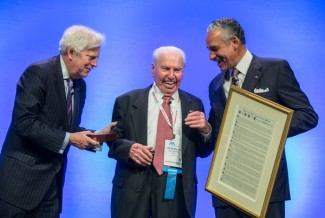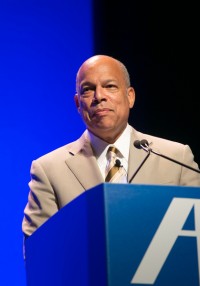Retired general wins ABA medal; DHS secretary calls immigration system 'broken' in keynote

ABA President James R. Silkenat presents the ABA Medal to
Gen. Earl E. Anderson; former ABA President Robert
Grey is on Anderson’s right. Photo by ©Kathy Anderson.
The ABA General Assembly on Saturday in the capacious Veterans Memorial Auditorium at Boston’s Hynes Convention Center was a patriotic affair, with a fife and drum rendition of the “Star-Spangled Banner”; the emotional and passionate speech of a 95-year-old retired Marine general who fought in three wars and was later active in ABA leadership; and a promise from the Secretary of the Department of Homeland Security that President Barack Obama soon will announce some executive action for immigration reform in response to inaction by Congress.
Just the simple math is impressive about retired four-star Marine Gen. Earl E. Anderson, who was awarded the ABA Medal. He was a 30-year-old Marine officer and aviator as well as a full-time law student when he joined the association 64 years ago, in 1950. But his long list of high-profile achievements—including his unusually productive, high-level activities in ABA leadership over the years after turning 69—are even more impressive.
Anderson was introduced by Robert Grey, a former ABA president who grew close to Anderson when the retired general became more active in the association. Anderson, who was a bomber pilot and later flew helicopters in combat, used a cane to take the podium. He spoke about freedom and justice. At times tearing and choking up, Anderson recounted the individual sacrifices of some friends in war—deaths, he said, that preserved freedom and justice.
After quoting the 19th century lawyer-statesman Daniel Webster’s description of justice as “the ligament which holds civilized beings and civilized nations together,” Anderson said, “now, I believe with all my heart that the American Bar Association keeps the ligament of justice strong.”
It is an organization, he said, “that works tirelessly for freedom and justice and whose moral compass is pointed always, always, to true north.”
Anderson has chaired or been a member of dozens of committees and task forces over the years, ranging from risk management and avoidance to national security and legal assistance for military personnel. From 2001-2004 he was on the Board of Governors. He seems proudest of his major role in the creation of the ABA’s Government and Public Sector Lawyers Division in 1991. He chaired the division in 1994. “We needed a forum for them to participate,” Anderson says in an interview. “They were one-eighth of all lawyers in the U.S.”
A year after retiring from the military in 1975, Anderson became head of the Office of U.S. Foreign Disaster Assistance and later was named head of the office of the U.N. Disaster Relief Coordinator. Then, in 1988, he took up the invitation of a friend who was incoming chair of the ABA’s General Practice Section to become active in association efforts, beginning as chair of a new committee on government lawyers—and thus began decades of sometimes path-breaking work for the profession.
He had been selected in 1949 as one of a handful of officers to go to law school.
After graduating, he could see that no Marine Corps lawyers were general officers—there was just a single full-bird colonel. So Anderson continued as an aviator in combat arms.

Jeh Johnson. Photo by ©Kathy Anderson.
Following Anderson, DHS Secretary Jeh Johnson noted that he, too, believes in the importance of the ABA: “I pay my dues every year.” When that drew some laughs, he asked if paying up was unusual.
Johnson gave both an update and rundown on various DHS initiatives of late, noting, for example, that after illegal immigration through the Rio Grande Valley sector “spiked to unprecedented levels” in mid-June, the numbers have dropped significantly.
He noted that Congress has failed to enact comprehensive immigration reform. “We are disappointed that Congress left town a week ago” without providing DHS with money to enforce the laws as they are now when it comes to the border problem.
“We’ve had to reprogram hundreds of millions of dollars from other homeland security missions,” Johnson said, adding that “our immigration system is broken, everyone agrees, but Congress has refused to fix it.”
So, he said, the president soon will announce a series of reforms through executive action “that we believe we can take within the confines of existing law.”
Write a letter to the editor, share a story tip or update, or report an error.


